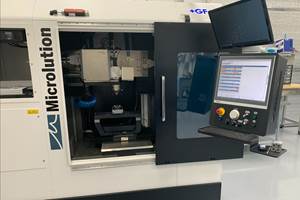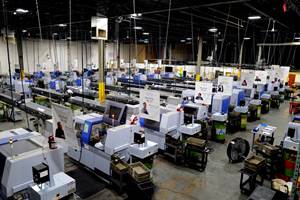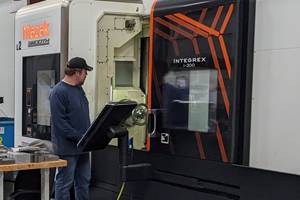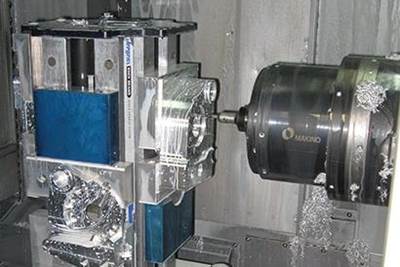Shop Reins in Lead Times with Compact HMCs
Alicat Science experienced a surge in business that drove lead times to 28 days. KMH300A horizontal machining centers reduced lead times to five days and gave the shop the capacity for subsequent business growth.
Share




Alicat Scientific, a manufacturer of instruments for flow and control in gas and liquid applications, was having a good year. But that brought a challenge. The surge in orders overwhelmed the shop’s vertical machining center capacity, driving lead times up by six times, prompting Alicat to seek additional equipment. A Kiwa horizontal machining center from Methods Machine Tools helped the shop’s production catch up with sales.
Based in Tucson, Arizona, the ISO 9001-certified company has been designing and manufacturing precision instruments since 1991. Alicat, whose products can be found in contexts ranging from mining projects to NASA space programs and even artificial heart machines, claims the flexibility and durability of its instruments sets it apart.
Surprised by a 300-mm HMC
Whatever the cause of Alicat’s success, it eventually pushed the shop past the limits of its capacity. With lead times reaching 28 days, shop manager Greg Camron began looking to add a new machine to the shop floor.

Left to right: Greg Camron, machine shop manager, Alicat; Bernie Otto, Kiwa Japan product manager, Methods Machine Tools; Tony Harrod, Methods sales manager; Larry Brown, Methods sales engineer.
Alicat was first introduced to Methods Machine Tools a year before when the shop purchased a used VMC from a customer, with installation assisted by Methods Phoenix. During his machine research, Mr. Camron met with Tony Harrod, a sales manager with Methods Phoenix, who recommended getting an HMC. Mr. Harrod knew that floor space in Alicat’s shop was limited, which is one of the reasons the shop had not considered HMCs before. For this reason, he talked to Mr. Camron about the Kiwa KMH300A, a 300-mm machine that fit the shop’s spacing needs.
At first, Mr. Camron was skeptical about the machine’s capability. He had been told by other salespeople in the past that a 300-mm machine would not have the capability to cut stainless. The small footprint made this particular model more attractive. “We decided to take shot with the KMH300A and trusted Tony when he said it would be able to handle the job,” he says. “The results blew us away.”
Within two weeks, Alicat’s first KMH300A was making chips. Within another six weeks, the shop was so impressed that it bought a second. Between these two machines, the shop was able to pull itself out of its production hole and bring lead times back down to a maximum of five days.
“We are cutting 316 stainless at 140 ipm and 303 stainless at 200 ipm,” Mr. Camron says. “The machines are cutting so well that it sounds like I am cutting aluminum instead of stainless steel.”
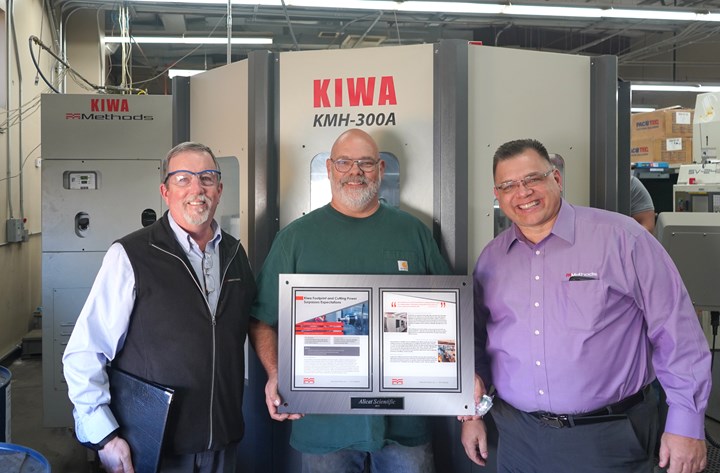
Mr. Otto and Mr. Harrod present Mr. Camron with a plaque in front of one of the Kiwa horizontal machining centers that helped bring Alicat out of its production hole.
Going Unattended
The two KMH300As sustained production until 2017, when Alicat went through another period of massive growth, which prompted the shop to add a third KMH300A, this one with a PC6 pallet pool. The added pallets enabled Mr. Camron to run the machines unattended overnight, trusting the machine’s reliability. A year later, Alicat purchased another KMH300A with a PC6.
“Since switching over to the Kiwas, we have shortened our time per part by about 50% and are now running 24/7. We have three shifts and have no problem letting the Kiwas run unattended, knowing that they are going to keep going without any issues,” Mr. Camron says.
The Kiwa KMH-300 series of machines features an integrated full rotary B axis and FANUC Oi-MF control. A spindle oil cooling system and coolant-through ballscrews are standard. Including the chip conveyor, the KMH-300 takes up a footprint of 140 by 107 inches. According to Methods, this is the same amount of space taken up by a typical 30- by 20-inch VMC. Standard features include dual 320-mm pallets; roller guideways; a 15-hp, 15,000-rpm direct-drive Big Plus spindle; and large-width doors and panels to ease setup and maintenance. For chip evacuation, the machines combine features like an overhead shower system, chip conveyor/coolant tank and pumps, and dual internal chip augers.
Mr. Camron says three features have benefited Alicat the most:
- The standard Big Plus spindle improved tool stability and thus improved finishes.
- The roller-bearing ways provide stability and allow for high-feed machining to increase material removal rates.
- The change to horizontal milling provided better chip evacuation and coolant flow to prevent recutting of chips.
Related Content
Where Micro-Laser Machining Is the Focus
A company that was once a consulting firm has become a successful micro-laser machine shop producing complex parts and features that most traditional CNC shops cannot machine.
Read MoreOrthopedic Event Discusses Manufacturing Strategies
At the seminar, representatives from multiple companies discussed strategies for making orthopedic devices accurately and efficiently.
Read MoreInside the Premium Machine Shop Making Fasteners
AMPG can’t help but take risks — its management doesn’t know how to run machines. But these risks have enabled it to become a runaway success in its market.
Read More5 Tips for Running a Profitable Aerospace Shop
Aerospace machining is a demanding and competitive sector of manufacturing, but this shop demonstrates five ways to find aerospace success.
Read MoreRead Next
The Costs and Benefits of Horizontal Machining
The shift from vertical to horizontal machining was even more expensive than this shop anticipated. It was also more valuable. Most of the shop’s machining centers are HMCs now—here’s why.
Read More5 Rules of Thumb for Buying CNC Machine Tools
Use these tips to carefully plan your machine tool purchases and to avoid regretting your decision later.
Read MoreBuilding Out a Foundation for Student Machinists
Autodesk and Haas have teamed up to produce an introductory course for students that covers the basics of CAD, CAM and CNC while providing them with a portfolio part.
Read More























